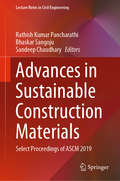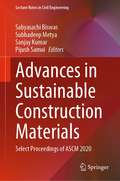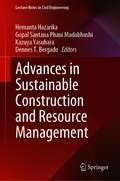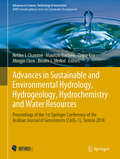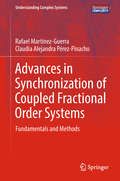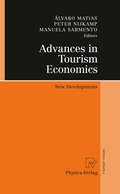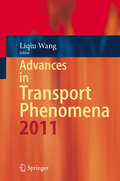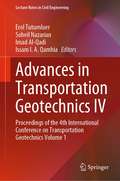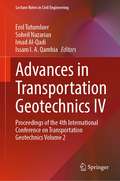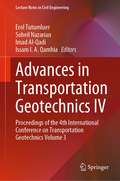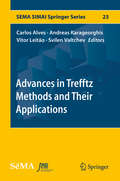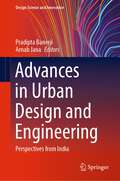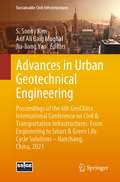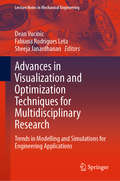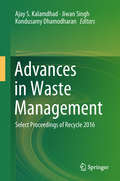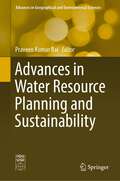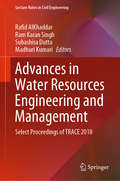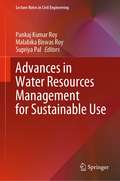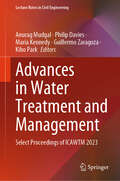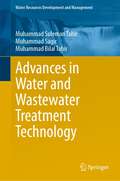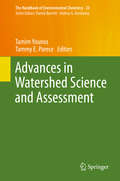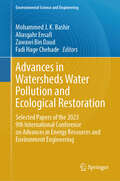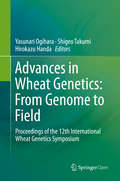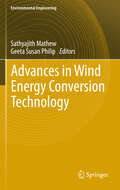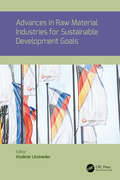- Table View
- List View
Advances in Sustainable Construction Materials: Select Proceedings of ASCM 2019 (Lecture Notes in Civil Engineering #68)
by Rathish Kumar Pancharathi Bhaskar Sangoju Sandeep ChaudharyThis book presents select proceedings of the National Conference on Advances in Sustainable Construction Materials (ASCM 2019) held at the National Institute of Technology, Warangal, India. The book includes contributions from academics and practitioners on low-energy cement technologies, innovative materials and structural technologies towards cost-effective, environment friendly, durable, energy-efficient, and sustainable construction. The topics covered emphasize on cutting-edge, economically viable, and sustainable solutions with an aim to increase profitability, and decrease construction time and overall impact on the built environment. The book will be useful for researchers and practitioners interested in sustainable construction and allied fields.
Advances in Sustainable Construction Materials: Select Proceedings of ASCM 2020 (Lecture Notes in Civil Engineering #124)
by Sanjay Kumar Pijush Samui Sabyasachi Biswas Subhadeep MetyaThis book presents select proceedings of National Conference on Advances in Sustainable Construction Materials (ASCM 2020) and examines a range of durable, energy-efficient, and next-generation construction materials produced from industrial wastes and by-products. The topics covered include sustainable materials and construction, innovations in recycling concrete, green buildings and innovative structures, utilization of waste materials in construction, geopolymer concrete, self-compacting concrete by using industrial waste materials, nanotechnology and sustainability of concrete, environmental sustainability and development, recycling solid wastes as road construction materials, emerging sustainable practices in highway pavements construction, plastic roads, pavement analysis and design, application of geosynthetics for ground improvement, sustainability in offshore geotechnics, green tunnel construction technology and application, ground improvement techniques and municipal solid waste landfill. Given the scope of contents, the book will be useful for researchers and professionals working in the field of civil engineering and especially sustainable structures and green buildings.
Advances in Sustainable Construction and Resource Management (Lecture Notes in Civil Engineering #144)
by Hemanta Hazarika Kazuya Yasuhara Gopal Santana Phani Madabhushi Dennes T. BergadoThis book comprises the proceedings of the 1st International Symposium on Construction Resources for Environmentally Sustainable Technologies. The contents of this volume focus on issues related to natural and man-made disasters, and discuss solutions through the use of alternative resources, towards building a sustainable and resilient society from geotechnical perspectives. Some of the themes covered include recycled materials in geotechnical constructions, management and utilization of disaster wastes, climate change independent natural disasters, socio-economic and environmental aspects in sustainable construction, physical and numerical modelling of disaster mitigation techniques, etc. This book will be beneficial to researchers, practitioners, and policy-makers alike.
Advances in Sustainable and Environmental Hydrology, Hydrogeology, Hydrochemistry and Water Resources: Proceedings of the 1st Springer Conference of the Arabian Journal of Geosciences (CAJG-1), Tunisia 2018 (Advances in Science, Technology & Innovation)
by Mingjie Chen Helder I. Chaminé Maurizio Barbieri Ozgur Kisi Broder J. MerkelThis book comprises the selected papers from the 1st Springer Conference of the Arabian Journal of Geosciences (CAJG-1), Tunisia 2018. The volume is of interest to all researchers and practitioners in the fields of Hydrology, Hydrogeology, Hydrochemistry, Water Resources and Hydrologic Engineering. Water is a dynamic, finite, and vulnerable but resilient natural resource to be protected in an environmentally sustainable manner. Water systems in different frameworks requires a comprehensive understanding of climatology, geology, hydrogeology, hydrochemistry, hydrodynamics, and surface hydrology. In addition, it is highlighted the role of the variability and climate change in water systems. Furthermore, water has a vital significance to the entire socio-economic sector. This volume offers an overview of the state-of-the-art related to water science and technology in model regions in Europe, Africa, Middle East, Asia and America, but mainly focuses on the Mediterranean environment and surrounding regions. It gives new insights on characterisation, evaluation, quality, management, protection, modelling on environmental hydrology, groundwater, hydrochemistry, sustainable water resources studies and hydrologic engineering approaches by international researchers. Main topics include: 1. Hydrology, Climatology and Water-Related Ecosystems2. Hydrochemistry and Isotopic Hydrology3. Groundwater Assessment and Management: mapping, exploration, abstraction and modelling4. Water Resources Sustainability and Climate Change5. Hydrologic Engineering and Urban Groundwater
Advances in Synchronization of Coupled Fractional Order Systems: Fundamentals and Methods (Understanding Complex Systems)
by Rafael Martínez-Guerra Claudia Alejandra Pérez-PinachoAfter a short introduction to the fundamentals, this book provides a detailed account of major advances in applying fractional calculus to dynamical systems. Fractional order dynamical systems currently continue to gain further importance in many areas of science and engineering. As with many other approaches to mathematical modeling, the first issue to be addressed is the need to couple a definition of the fractional differentiation or integration operator with the types of dynamical systems that are analyzed. As such, for the fundamentals the focus is on basic aspects of fractional calculus, in particular stability analysis, which is required to tackle synchronization in coupled fractional order systems, to understand the essence of estimators for related integer order systems, and to keep track of the interplay between synchronization and parameter observation. This serves as the common basis for the more advanced topics and applications presented in the subsequent chapters, which include an introduction to the 'Immersion and Invariance' (I&I) methodology, the masterslave synchronization scheme for partially known nonlinear fractional order systems, Fractional Algebraic Observability (FAO) and Fractional Generalized quasi-Synchronization (FGqS) to name but a few. This book is intended not only for applied mathematicians and theoretical physicists, but also for anyone in applied science dealing with complex nonlinear systems.
Advances in Tourism Economics: New Developments
by Peter Nijkamp Manuela Sarmento Álvaro Matias'Advances in Tourism Economics' follows his predecessor 'Advances in Modern Tourism Research' (2007) in providing a thorough assessment of state-of-the-art economic research in this rapidly developing field. The authors start by analyzing the recent upsurge of model-based economic research in the field, which builds on powerful tools in quantitative economics, such as discrete choice models, social accounting matrices, data envelopment analyses, impact assessment models or partial computable equilibrium models including environmental externalities. The volume originates from this novel research spirit in the area and aims to offer an attractive collection of operational research tools and approaches. It forms an appealing record of modern tourism economics and positions the field within the strong tradition of quantitative economic research, with due attention for both the demand and supply side of the tourism sector, including technological and logistic advances.
Advances in Transport Phenomena 2011 (Advances in Transport Phenomena #3)
by Liqiu WangThis new volume of the annual review "Advances in Transport Phenomena" series contains three in-depth review articles on the microfluidic fabrication of vesicles, the dielectrophoresis field-flow fractionation for continuous-flow separation of particles and cells in microfluidic devices, and the thermodynamic analysis and optimization of heat exchangers, respectively.
Advances in Transportation Geotechnics IV: Proceedings of the 4th International Conference on Transportation Geotechnics Volume 1 (Lecture Notes in Civil Engineering #164)
by Imad Al-Qadi Erol Tutumluer Soheil Nazarian Issam I. A. QamhiaThis volume presents selected papers presented during the 4th International Conference on Transportation Geotechnics (ICTG). The papers address the geotechnical challenges in design, construction, maintenance, monitoring, and upgrading of roads, railways, airfields, and harbor facilities and other ground transportation infrastructure with the goal of providing safe, economic, environmental, reliable and sustainable infrastructures. This volume will be of interest to postgraduate students, academics, researchers, and consultants working in the field of civil and transport infrastructure.
Advances in Transportation Geotechnics IV: Proceedings of the 4th International Conference on Transportation Geotechnics Volume 2 (Lecture Notes in Civil Engineering #165)
by Imad Al-Qadi Erol Tutumluer Soheil Nazarian Issam I. A. QamhiaThis volume presents selected papers presented during the 4th International Conference on Transportation Geotechnics. The papers address the geotechnical challenges in design, construction, maintenance, monitoring, and upgrading of roads, railways, airfields, and harbor facilities and other ground transportation infrastructure with the goal of providing safe, economic, environmental, reliable and sustainable infrastructures. This volume will be of interest to postgraduate students, academics, researchers, and consultants working in the field of civil and transport infrastructure.
Advances in Transportation Geotechnics IV: Proceedings of the 4th International Conference on Transportation Geotechnics Volume 3 (Lecture Notes in Civil Engineering #166)
by Imad Al-Qadi Erol Tutumluer Soheil Nazarian Issam I. A. QamhiaThis volume presents selected papers presented during the 4th International Conference on Transportation Geotechnics. The papers address the geotechnical challenges in design, construction, maintenance, monitoring, and upgrading of roads, railways, airfields, and harbor facilities and other ground transportation infrastructure with the goal of providing safe, economic, environmental, reliable and sustainable infrastructures. This volume will be of interest to postgraduate students, academics, researchers, and consultants working in the field of civil and transport infrastructure.
Advances in Trefftz Methods and Their Applications (SEMA SIMAI Springer Series #23)
by Carlos Alves Andreas Karageorghis Vitor Leitão Svilen ValtchevIn this book we gather recent mathematical developments and engineering applications of Trefftz methods, with particular emphasis on the Method of Fundamental Solutions (MFS). These are true meshless methods that have the advantage of avoiding the need to set up a mesh altogether, and therefore going beyond the reduction of the mesh to a boundary. These Trefftz methods have advantages in several engineering applications, for instance in inverse problems where the domain is unknown and some numerical methods would require a remeshing approach.Trefftz methods are also known to perform very well with regular domains and regular data in boundary value problems, achieving exponential convergence. On the other hand, they may also under certain conditions, exhibit instabilities and lead to ill-conditioned systems. This book is divided into ten chapters that illustrate recent advances in Trefftz methods and their application to engineering problems. The first eight chapters are devoted to the MFS and variants whereas the last two chapters are devoted to related meshless engineering applications. Part of these selected contributions were presented in the 9th International Conference on Trefftz Methods and 5th International Conference on the MFS, held in 2019, July 29-31, in Lisbon, Portugal.
Advances in Urban Design and Engineering: Perspectives from India (Design Science and Innovation)
by Arnab Jana Pradipta BanerjiThis volume discusses a combination of topics dealing with the wide variety of urban planning, authored by well reputed scholars in India mastering disciplines such as architecture, urban design, transportation planning, public policy, urban planning, urban engineering and civil engineering. It focuses on contemporary problems in metro cities like New Delhi, Ahmedabad, Mumbai, etc. This book also highlights critical aspects of urban developments while considering the aspects of mega infrastructure projects especially related to water, waste water treatment and environmental issues.
Advances in Urban Geotechnical Engineering: Proceedings of the 6th GeoChina International Conference on Civil & Transportation Infrastructures: From Engineering to Smart & Green Life Cycle Solutions -- Nanchang, China, 2021 (Sustainable Civil Infrastructures)
by S. Sonny Kim Arif Ali Baig Moghal Jia-Liang YaoThis volume discusses a compilation of studies regarding transportation geotechnics, geomechanics, rock mechanics, and geosynthetics reinforced soils from the 6th GeoChina International Conference held in NanChang, China, July 19-21, 2021.
Advances in Visualization and Optimization Techniques for Multidisciplinary Research: Trends in Modelling and Simulations for Engineering Applications (Lecture Notes in Mechanical Engineering)
by Fabiana Rodrigues Leta Dean Vucinic Sheeja JanardhananThis volume presents several multidisciplinary approaches to the visual representation of data acquired from experiments. As an expansion of these approaches, it is also possible to include data examination generated by mathematical-physical modeling. Imaging Systems encompass any subject related to digital images, from fundamental requirements for a correct image acquisition to computational algorithms that make it possible to obtain relevant information for image analysis. In this context, the book presents selected contributions of a special session at the Conference on Advanced Computational Engineering and Experimenting (ACE-X) 2016.
Advances in Waste Management: Select Proceedings of Recycle 2016
by Ajay S. Kalamdhad Jiwan Singh Kondusamy DhamodharanThis book presents some of the latest technologies in waste management, and emphasizes the benefits that can be gained from the use of recycled products. Divided into four sections, it deals with phytoremediation, acquatic weed management and the treatment of solid- and water-based wastes, such as those arising from agricultural, industrial and medical activities. With its special emphasis on the utilization of recycled products, this volume will be of interest to students, academicians, policy makers and others who have a practical and academic interest in dealing with the waste society generates.
Advances in Water Resource Planning and Sustainability (Advances in Geographical and Environmental Sciences)
by Praveen Kumar RaiSustainable water resources planning deals with the interface of water resources science and the needs of human populations. It highlights works that addresses practical methods and basic research in, for example: quantity and quality management of groundwater and surface water resources; sustainability of water resources and water availability; water use and reuse including managed aquifer recharge and storage; geopolitical and socio-economic aspects of water resource management; water development and human activity impacts on ecological systems and human health, including, for instance, agricultural and climatic impacts, subsurface waste storage and injection, geothermal energy development and subsurface energy storage. This book provides up-to-date systematic and scientific analyses of such water problems and suggests sustainable measures to overcome them through effective surface and sub-surface water resource management. It is immensely valuable to students, researchers, water resource managers, hydrologists and all those who are engaged or interested in any aspect of river water conservation and management of water resources.
Advances in Water Resources Engineering and Management: Select Proceedings of TRACE 2018 (Lecture Notes in Civil Engineering #39)
by Madhuri Kumari Rafid AlKhaddar Ram Karan Singh Subashisa DuttaThis book comprises select papers presented at the International Conference on Trends and Recent Advances in Civil Engineering (TRACE 2018). The book covers inter-disciplinary research and applications in integrated water resource management, river ecology, irrigation system, water pollution and treatment, hydraulic structure and hydro-informatics. The topics on water resource management include technological intervention and solution for climate change impacts on water resources, water security, clean water to all, sustainable water reuse, flood risk assessment, interlinking of rivers and hydro policy. The contents of this book will be useful to researchers and professionals working in the field of water resource management and related policy making.
Advances in Water Resources Management for Sustainable Use (Lecture Notes in Civil Engineering #131)
by Pankaj Kumar Roy Malabika Biswas Roy Supriya PalThis book presents the innovative ideas and technical expertise for the sustainable solution in the field of water resources. It covers various topics on sustainable water resources management under climate change where researchers and professionals have shared their experience, innovative ideas, issues, recent trends and future directions in field of water resources engineering, science and technology. This book culminates the importance of achieving the ways towards water security and espouse targets and measures that will allow the end-user to meet this challenge in conjunction. It is a compendium of research articles pertaining to the mitigation of water crisis, surface and groundwater management, watershed management and modelling, case studies related to wetland vulnerability, water pollution, water quality, extreme climate hazards and others issues and its sustainable diminution through ingenious ideas and technologies that will incur valuable information to the stakeholders in the society. Given its scope, this book will be useful for the researchers and professionals.
Advances in Water Treatment and Management: Select Proceedings of ICAWTM 2023 (Lecture Notes in Civil Engineering #536)
by Philip Davies Guillermo Zaragoza Anurag Mudgal Maria Kennedy Kiho ParkThis book presents the select proceedings of International Conference on Advances in Water Treatment and Management (ICAWTM 2023). It covers the recent trends in water treatment processes. Various topics covered include innovative process developments in water treatment, renewable energy-assisted desalination processes, conceptual design, and process hybridization for water treatment. The book is highly useful for researchers and professionals in the fields of water treatment, renewable energy, industrial chemistry, and many other allied fields.
Advances in Water and Wastewater Treatment Technology (Water Resources Development and Management)
by Muhammad Sagir Muhammad Bilal Tahir Muhammad Suleman TahirThis book highlights the several pollutants and their derivatives that exist in water and wastewater, such as pharmaceuticals, antibiotics, personal care products, heavy metals, pesticides, dyes etc., as a result of rapid urbanization and industrialization. Several part pollution is caused by nutrients, organics, and contaminants with low concentration but is highly toxic to human and aquatic environment. This book provides a holistic approach in terms of measurement, monitoring, and recent advances in treatment technologies for water and wastewater treatment and water reuse. The technologies involve the physio-chemical, biological and advanced oxidation processes in which they are modified or coupled with nanomaterials and/or newly developed products for improving the performance of the current treatment processes. In addition, the membrane processes include recent research on the removal of challenging chemicals by various membrane bioreactors and reverse osmosis processes.
Advances in Watershed Science and Assessment (The Handbook of Environmental Chemistry #33)
by Tamim Younos Tammy E. PareceThis volume offers concepts, methods and case studies of innovative and evolving technologies in the area of watershed assessment. Topics discussed include: (1) Development and applications of geospatial, satellite imagery and remote sensing technologies for land monitoring; (2) Development and applications of satellite imagery for monitoring inland water quality; (3) Development and applications of water sensor technologies for real-time monitoring of water quantity and quality; and (4) Advances in biological monitoring and microbial source tracking technologies. This book will be of interest to graduate students and researchers involved in watershed science and environmental studies. Equally, it will serve as a valuable guide to experts in government agencies who are concerned with water-availability and water-quality issues, and engineers and other professionals involved in the design of land- and water-monitoring systems.
Advances in Watersheds Water Pollution and Ecological Restoration: Selected Papers of the 2023 9th International Conference on Advances in Energy Resources and Environment Engineering (Environmental Science and Engineering)
by Fadi Hage Chehade Zawawi Bin Daud Mohammed J. K. Bashir Aliasgahr EnsafiThis book provides a glimpse into the cutting-edge research on pollution management and detection in the water environments of watersheds, covering topics like water pollution traceability, pollution monitoring, and management techniques. According to the United Nations World Water Development Report provided by the World Water Forum, millions of tons of garbage are dumped into rivers, lakes, and streams around the world every day, and every liter of wastewater pollutes eight liters of freshwater, causing a serious damage to the water environment in watersheds. The protection and prevention of water in watersheds, which is related to freshwater resources for human development and survival, has always been a crucial research direction in the field of environmental engineering. This book aims to promote the exchange of scientific information among scholars from the world's leading universities, research centers, and high-tech companies and is of great benefit to researchers and professionals in the field of environmental control of watershed management.
Advances in Wheat Genetics: Proceedings of the 12th International Wheat Genetics Symposium
by Yasunari Ogihara Shigeo Takumi Hirokazu HandaThis proceedings is a collection of 46 selected papers that were presented at the 12th International Wheat Genetics Symposium (IWGS). Since the launch of the wheat genome sequencing project in 2005, the arrival of draft genome sequences has marked a new era in wheat genetics and genomics, catalyzing rapid advancement in the field. This book provides a comprehensive review of the forefront of wheat research, across various important topics such as germplasm and genetic diversity, cytogenetics and allopolyploid evolution, genome sequencing, structural and functional genomics, gene function and molecular biology, biotic stress, abiotic stress, grain quality, and classical and molecular breeding. Following an introduction, 9 parts of the book are dedicated to each of these topics. A final, 11th part entitled "Toward Sustainable Wheat Production" contains 7 excellent papers that were presented in the 12th IWGS Special Session supported by the OECD. With rapid population growth and radical climate changes, the world faces a global food crisis and is in need of another Green Revolution to boost yields of wheat and other widely grown staple crops. Although this book focuses on wheat, many of the newly developed techniques and results presented here can be applied to other plant species with large and complex genomes. As such, this volume is highly recommended for all students and researchers in wheat sciences and related plant sciences and for those who are interested in stable food production and food security.
Advances in Wind Energy Conversion Technology (Environmental Science and Engineering)
by Geeta Susan Philip Mathew SathyajithWith an annual growth rate of over 35%, wind is the fastest growing energy source in the world today. As a result of intensive research and developmental efforts, the technology of generating energy from wind has significantly changed during the past five years. The book brings together all the latest aspects of wind energy conversion technology - right from the wind resource analysis to grid integration of the wind generated electricity. The chapters are contributed by academic and industrial experts having vast experience in these areas. Each chapter begins with an introduction explaining the current status of the technology and proceeds further to the advanced lever to cater for the needs of readers from different subject backgrounds. Extensive bibliography/references appended to each chapter give further guidance to the interested readers.
Advances in raw material industries for sustainable development goals: PROCEEDINGS OF THE XII RUSSIAN-GERMAN RAW MATERIALS CONFERENCE (SAINT-PETERSBURG, RUSSIA, 27-29 NOVEMBER 2019)
by Vladimir Litvinenko"Advances in Raw Material Industries for Sustainable Development Goals" presents the results of joint scientific research conducted in the context of the Russian-German Raw Materials Forum. Today Russia and Germany are exploring various forms of cooperation in the field of mining, geology, mineralogy, mechanical engineering and energy. Russia and Germany are equally interested in expanding cooperation and modernizing the economy in terms of sustainable development. The main theme of this article collection is connected with existing business ventures and ideas from both Russia and Germany. In this book the authors regard complex processes in mining industry from various points of view, including: - modern technologies in prospecting, exploration and development of mineral resources- progressive methods of natural and industrial mineral raw materials processing- energy technologies and digital technologies for sustainable development- cutting-edge technologies and innovations in the oil and gas industry. Working with young researchers, supporting their individual professional development and creating conditions for their mobility and scientific cooperation are essential parts of Russian-German Raw Materials Forum founded in Dresden 13 years ago. This collection represents both willingness of young researchers to be involved in large-scale international projects like Russian-German Raw Material Forum and the results of their long and thorough work in the promising areas of cooperation between Russia and Germany.
